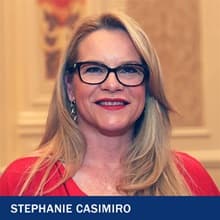What is Marketing and What Can You Do with a Marketing Degree?

Understanding the Numbers
When reviewing job growth and salary information, it’s important to remember that actual numbers can vary due to many different factors — like years of experience in the role, industry of employment, geographic location, worker skill and economic conditions. Cited projections do not guarantee actual salary or job growth.
Marketing is an ever-evolving and dynamic career choice. From traditional definitions and roles to new strategies and technology tools, marketing can be an exciting and stimulating professional path. Your marketing degree will enable you to explore many exciting career avenues.
In Simple Words, What is Marketing?
The broad definition of “what is marketing” is changing at a lightning pace these days. At its core, marketing is a multi-pronged endeavor across platforms, to present a product or service to the public, to express a company’s voice, mission and brand, and to explain how it meets the researched needs and desires of potential consumers.
Marketing can encompass everything from the customer experience on a website or with TV, print or digital advertisements, to retailing, branding, market research and much more.

For some, a career in marketing is the perfect pairing of left and right-brain modalities. Marketing is “a combination of business and creative. Art and science, anything you want it to be,” said Steve Geibel, an adjunct instructor at SNHU as well as the managing director of Hype Creative Group and owner of Urbane Commando.
Why Should You Get a Marketing Degree?
It’s an exciting time to be a marketer. In the digital age, the Mad Men of the past are yielding to the tech-savvy marketers of today. A marketing degree will enhance your knowledge of current trends and practices.

“If you got a bachelor’s degree in marketing, there are a variety of directions you can go with it. A master's is more intense, if you’re really interested in detailed marketing and management,” Geibel said. "Most of my Master of Science (MS) in Marketing students are looking towards the management track — VPs, chief marketing officers."
When it comes to a career in marketing there are many benefits to earning a marketing degree.
Career Options
“A lot of degrees pigeonhole you, but marketing can lead you anywhere,” Geibel said. “There’s the whole component of online marketing, such as databases, search engine optimization (SEO), analytics and data. Some specific careers in the modern age of marketing include social media manager, email marketing — a lot of companies have someone just dedicated to that."
A marketing career allows you to have passions or interests in other areas as well, Rogers said. “Consider the student who loves music. Perhaps they work in marketing for the music industry. Or perhaps healthcare — we see marketing minds in the healthcare and fitness industries. Education as well," she said. "The idea of being able to work in a wide variety of industries is appealing to many. The sky's the limit, every industry needs marketing in one way or another.”

“I only had the confidence to pitch to that (company) because I was in the master's program,” Casimiro said. “I landed the job because I knew about marketing analytics and data (return on investment.) They actually waited for me because they knew I was pursuing my education. They value marketing and had gone as far as they could without it.”
Job Security
Because of its use of digital and online communication with sought-after audiences, marketing has a good built-in buffer against changing economic and industry variables.
“A good thing about marketing is that it has the potential to not be affected by the current state of affairs,” Geibel said. “So much of marketing tasks can be done remotely and digitally — even (learning and) teaching remotely.”
Expanding Professional Field

“Marketing is an interesting career because it lives at the intersection of creativity, critical thinking and communication,” said Marcio Moerbeck, adjunct faculty at SNHU.
If you’re a person who thrives in one of those three areas, you can go in one or more directions. “You could be a creative content writer, or do the marketing data analysis, or if you love talking to people, be a salesperson," Moerbeck said. "The most important aspect of marketing is how to communicate internally and externally for the company.”
A career in marketing means you’re always learning and changing your techniques and approaches to the job challenges, as new information comes to light. Marketing is for the curious, Moerbeck said. “You need to have a thirst for learning. Success in marketing is around always learning and being inquisitive. If you want to join a career where your knowledge today stays static into the future, that’s not marketing. We are constantly learning.”

Hot on the ‘Market’: Some Top Marketing Careers
There are many stimulating directions that marketing can take your career. Here are a few that labor statistics are indicating are good potential growth areas.
Digital Marketing
The top of the list of popular marketing jobs has to be the category of digital marketing.
“When you say the words ‘digital marketing,’ nine out of 10 people assume you mean social media. But that’s just one piece,” Geibel said. “Some think because they spend so much time on Facebook, that social media marketing would be a fun job to have. But if you don’t know how to analyze the effectiveness of those campaigns, the work is in vain.”
Moerbeck said it’s important to incorporate all avenues when marketing. “Email, website, display ads, social media … there are many platforms in digital marketing," he said. "Brand building and engagement, thought leadership. A lot of selling to prospects, but not real sales. As students get to understand digital marketing, they see it’s more than only social media.”
There are many types of digital marketing that you can pursue, including:
- Content writing creates and tends to thought-leadership blogs, and posts on social media platforms, creating shareable viral videos or visuals like infographics, and other content marketing.
- Email marketing creates targeted and ongoing email campaigns, and grows your company’s audience with their own buy-in, to build relationships and drive sales.
- Influencer marketing partners your marketing message with high-profile, highly-followed celebrities and other individuals to promote your company or brand.
- SEO writing adds keywords and specific content to website posts that create higher visibility to search engines, ideally attracting a more targeted demographic and more traffic to a company’s site.
- Social media marketing maximizes message visibility via social networks like Facebook, Instagram, Twitter and others, to foster sharing of a company’s mission and message.
Market Research Analyst
Experts in the field strongly encourage those interested in the marketing program to pursue education in data analysis. Those who possess high levels of proficiency and interest in analytical work and research could be well-suited to this field of marketing.
Market research analysts curate start-to-finish data gathering and interpretation, using software and statistical tools to determine market trends and campaign successes. “If I was getting a degree, I’d make sure to (take courses in) SEO and analytics, and gain a rudimentary understanding of how data works. You’ll need to know the nuts and bolts, especially if you want to be a VP or (chief marketing officer,)” Geibel said.
The critical data-analysis component is highly sought in the business world, Moerbeck said. Analysts trained to use software and marketing automation tools are essential to success, and often hard to find.
But these are tools that are critical and cost a lot for businesses, so one of the quickest ways to get a job in marketing is to be the specialist in automating and deploying those campaigns. "Marketing operations, how to use data analysis software, how to do data analysis. Everyone wants to focus on the creating side and on social media, but there’s a huge need for these automation experts and data analysts,” Moerbeck said.
The median annual wage for market research analysts was $63,920 in 2021, with a 19% projected job growth through 2031 according to the U.S. Bureau of Labor Statistics (BLS).
“This boost in employment is due to the increased use of data and market research to understand customers and to measure the effectiveness of business strategies, said Rogers.”
Marketing Manager
Similar to an analyst, a marketing manager estimates consumer demand and identifies potential markets for a product or service, as well as analyzing trends that could be beneficial to a company. Working across departments with sales, public relations and product development, marketing managers can also be involved in product development and business strategy.
Within an organization, marketing managers are generally responsible for coordinating marketing efforts, developing overall marketing strategies and overseeing product development. And that's only the beginning.
According to the BLS, the median annual wage for marketing managers was $133,380 in 2021, with a projected job growth of 10% through 2031.
Is a Marketing Program Right for You?
Your marketing degree could be a deciding factor in obtaining a plum position, even with experience, Casimiro said.
“It’s absolutely worth it; there’s never a downside to having a degree," she said. "It’s so difficult to stay up to date and on top of new changes” without that education. "Through your participation in the program, you will also meet a network of experts you can reach out to for the latest info and help."
“The marketing landscape has a lot to offer, and involves both a strategic approach as well as a creative one,” Rogers said. “So no matter what type of person you are, you can find a home in marketing.”
Discover more about SNHU's marketing degree: Find out what courses you'll take, skills you'll learn and how to request information about the program.
Kathleen Palmer is an award-winning journalist and writer.
Explore more content like this article

SNHU Spotlight: Jonathan Oubenslimane, BS in Business Administration Grad

How to Become a Recruiter

What Degree Do You Need for Human Resources?
About Southern New Hampshire University

SNHU is a nonprofit, accredited university with a mission to make high-quality education more accessible and affordable for everyone.
Founded in 1932, and online since 1995, we’ve helped countless students reach their goals with flexible, career-focused programs. Our 300-acre campus in Manchester, NH is home to over 3,000 students, and we serve over 135,000 students online. Visit our about SNHU page to learn more about our mission, accreditations, leadership team, national recognitions and awards.

